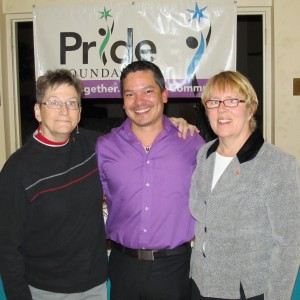Imagine having always lived in a rural community or making the decision to move to a small town to be near family. Maybe you just want to get away from hectic city living, you found other employment, or you plan to attend a local university. Whatever the reason, this isn’t a huge problem for most. For those who are HIV-positive, however, living in a very rural community can be a challenge because there are not many options when it comes to finding assistance and access to necessary services needed for quality of life or even survival.
Palouse HIV Consortium (PHC), a 2012 Pride Foundation grant recipient, is the only organization in Whitman County that supports persons living with HIV in cases where there is no other agency or insurance available to provide needed services. PHC helps with the costs of healthcare and social services needed to maximize health, self-sufficiency, and self-esteem. PHC serves a diverse population, including gay or bisexual clients (43%), African American clients (57%), and female clients (43%).
“Pride Foundation covers almost one-third of the United States area serving rural and remote areas throughout the Northwest,” says Pride Foundation Executive Director, Kris Hermanns. “Without grantees like Palouse HIV Consortium there would be enormous gaps in ensuring the well-being of people living with HIV in rural communities.
In February, Kris met with PHC staff to learn more about what it was like for a grantee to serve an isolated community. Pride Foundation’s most recent grant to PHC assisted in helping pay medical co-pays for low-income clients. Though medical co-pays may be an annoyance for most people, for those with low or fixed incomes, having co-pays covered can ensure access to vital treatment.
“The staff at PHC are saving lives and providing a much needed sense of support and community in Whitman County,” Kris adds. “They are achieving a lot with little resources.”
PHC Director Lavonne Hall and Assistant Director Judy Stone are Registered Nurses, each with over 20 years of experience working locally in HIV/AIDS counseling and testing, education, prevention, risk reduction, case management, and disbursing grant monies. They understand the valuable role they play in their community.
“The most common services include medical, dental, and vision co-pays, food, housing, utilities, and transportation. Specifically transportation is a hallmark service because it allows rural folks to access services not otherwise available in Whitman County,” says Judy.
Living with HIV while making the choice to live in a small town where access to essential healthcare and social services are sparse can be a real challenge. It’s wonderful and reassuring to see there’s an organization that recognizes this challenge and is able to assist with life in rural Washington.
Gunner Scott is Pride Foundation’s Director of Programs. Email Gunner.
